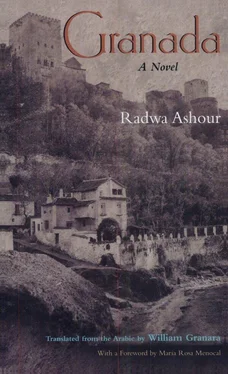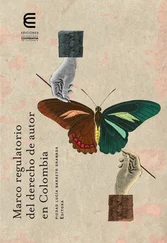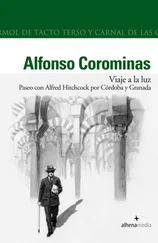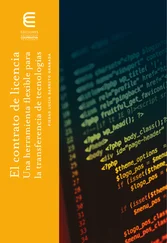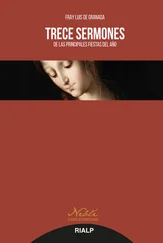Radwa Ashour - Granada
Здесь есть возможность читать онлайн «Radwa Ashour - Granada» весь текст электронной книги совершенно бесплатно (целиком полную версию без сокращений). В некоторых случаях можно слушать аудио, скачать через торрент в формате fb2 и присутствует краткое содержание. Год выпуска: 2003, ISBN: 2003, Издательство: Syracuse University Press, Жанр: Современная проза, Историческая проза, на английском языке. Описание произведения, (предисловие) а так же отзывы посетителей доступны на портале библиотеки ЛибКат.
- Название:Granada
- Автор:
- Издательство:Syracuse University Press
- Жанр:
- Год:2003
- ISBN:9780815607656
- Рейтинг книги:5 / 5. Голосов: 1
-
Избранное:Добавить в избранное
- Отзывы:
-
Ваша оценка:
- 100
- 1
- 2
- 3
- 4
- 5
Granada: краткое содержание, описание и аннотация
Предлагаем к чтению аннотацию, описание, краткое содержание или предисловие (зависит от того, что написал сам автор книги «Granada»). Если вы не нашли необходимую информацию о книге — напишите в комментариях, мы постараемся отыскать её.
Granada — читать онлайн бесплатно полную книгу (весь текст) целиком
Ниже представлен текст книги, разбитый по страницам. Система сохранения места последней прочитанной страницы, позволяет с удобством читать онлайн бесплатно книгу «Granada», без необходимости каждый раз заново искать на чём Вы остановились. Поставьте закладку, и сможете в любой момент перейти на страницу, на которой закончили чтение.
Интервал:
Закладка:
“Sorry, I was only kidding.”
What started out as mutual teasing and ended up in playful banter always got them laughing, as they repeated their verbal jabs like some exotic but familiar ritual that provoked an eruption of restrained speech that gushed forth in strong, loud spurts.
It fell to Saleema to convince her grandfather to let her and her brother go. Abu Jaafar insisted that it was a parade like any other, and that he didn’t see any special reason why they should go.
“I beg you, Grandfather, please let us go.”
“I don’t see why I should,” he responded.
But Saleema wouldn’t give up and persisted throughout the following day, this time with the help of her grandmother who took the position that she saw no reason at all not to let them go if it meant so much to them and made them so excited. She pulled Abu Jaafar aside and whispered in his ear: “Abu Jaafar, they’re just children. They shouldn’t be mourning, and they’re impatient. Let them go, at least for my sake.”
Whenever Saleema got an idea in her head, she would become so obsessed with it that no one individual nor the whole family in unison could sway her from it. If she wanted something, she held her ground and persisted in asking, never flinching or backing down one bit, nor would she let anyone rest in peace until she got what she wanted. Her mother would say of her, “Saleema has the qualities of a gnat, constantly droning, and useless in the house!” Umm Jaafar would laugh and say that Saleema was like the queen of Sheba, who wanted to give orders and be obeyed and not take orders from anyone else. She even nicknamed her “Sheba.”Yet despite all the joking, Umm Jaafar was concerned that her granddaughter didn’t even know how to fry an egg, and unlike other girls of her age from the neighborhood, she didn’t help her mother at all with the housework. Rather, it was her brother, two years her junior and more active and experienced than she, who was sent to the town’s public ovens, carried the trays offish and flat loaves of bread, who waited and paid the oven attendants and returned with the cooked food.
Abu Jaafar on the other hand wasn’t concerned about any of this in the least. He was all too aware of the fact that the girl’s laziness was completely compensated for by something else. Her mind was as sharp as a razor, and she never stopped poking around, observing, studying, and asking questions. She was only nine but had already learned by heart a third of the Quran and could recite it effortlessly and write in a clear and elegant hand. Her teacher marveled at how quickly she understood and readily grasped the complexities of Arabic grammar. As he watched her, it would touch his heart deeply to see how much his granddaughter, who had inherited his own blue eyes, had her father’s bright, attentive look, his intelligence and vivaciousness.
These days Saleema was totally absorbed by what was constantly being said about the discovery of a new world.
“Why is it new?” she asked.
“Because it was recently discovered. Before now, we didn’t know that it existed.”
“But that doesn’t make it new, Grandfather. When I first heard the expression I thought that God created it only recently, and I imagined its trees were little trees and that all the creatures in it were tiny newborns.” She laughed at her own words, and then said, “How stupid of me!”
In the end Abu Jaafar gave in and allowed Saleema and Hasan to go to the parade but only on condition that Saad and Naeem accompany them. He warned Hasan, “Watch out for your sister. There may be Castilian boys who don’t respect girls from good families. Be careful, and make sure you hold her hand. Don’t take your eyes off of her for one second.”
Two days later, the four of them set out to the town where the parade was to take place.
Although there was a cold breeze, the sky was clear, and the rays of the sun beamed on the river and warmed up the air, making it a pleasant spring morning. They chatted and chuckled with laughter, excited by the journey on which they were embarking and the wonderful parade that they couldn’t wait to see. As they approached the parade site, the crowd grew dense and the roads swarmed with people. Even the balconies, window ledges, and rooftops that looked onto both sides of the streets were overflowing with spectators. Everyone seemed highly animated, talking, laughing, calling out to one another, or buying something for the children from the vendors who sold fresh almonds, dried figs, or honey-soaked cakes. Then, suddenly, the crowd calmed down and the voices lowered, as necks began to stretch and eyes peered up ahead toward the top of the road. They could make out the rolling of the drums and the blowing of the bugles as the rifles and the bells rang out. These sounds magnified as they got closer, while the crowds drew to a near silence. People opened their eyes as wide as they could in the hopes of seeing as much as possible. The flag bearers appeared waving colorful flags, followed by the members of the band dressed in Castilian uniforms with their form-fitting trousers that came to the waist, their embroidered jackets, and caps. A man yelled out in Spanish, “Here he is! Look!” He was pointing to a horseman mounted on a magnificent white stallion trotting gracefully and rhythmically as though taken by its own beauty.
“Long live Christopher Columbus! Long live Christopher Columbus!”
The bearded horseman raised his black cap and with it waved to greet the crowds. He flashed a broad smile as though he were a king of kings. Saleema shouted, consumed by excitement, “They say that the land he discovered is full of gold and silver, and that he’s now on his way to Barcelona to offer the king and queen the treasures he found.”
“Why doesn’t he keep the treasures for himself?” Hasan asked.
“They don’t belong to him.”
“Why not?” Hasan asked.
She answered, “The king and queen gave him the money he needed for the trip. It’s as if they lent it to him to make the trip. Look, Saad, look!”
When the battalion of horsemen following the admiral passed, there appeared rows of men carrying large cages of magnificent birds of the most extraordinary colors. Some of the birds were as small as sparrows, others the size of parrots, and some were as large as geese. There were birds with gigantic talons the likes of which no one had ever seen. Some had exquisite crests that looked like crowns. Then next in the parade came men bearing glass chests through which you could see exotic creatures: huge spiders, giant snakes, and gruesome reptiles that made you frightened at the mere sight of them. The people followed the procession awestruck, riveted by something between excitement and fear of the strange new world that this grand knight had discovered.
And then, as though the organizers of the parade wanted the spectators to hold their breath, a group of men carrying all sorts of plants and vegetation marched, and soon the streets were adorned with palm leaves, not those of the familiar kinds, but branches of trees of unknown species. There were fruits in a brown shell that looked like wool, and some with peels as though they were cut from the trunk of a palm tree. Next came men carrying glass chests similar to those that passed by not too long before and through which you could see as plain as day what was inside, shimmering in the sunlight and dazzling to the eye. A woman shouted out, “It’s gold, pure gold!” The shout was repeated as the people stood speechless, with hearts pounding anxiously and eyes widening to get a better look at the chests that encased the pure gold. Sand of gold, whole slabs of solid gold, large ingots no one could have ever possibly imagined in his or her wildest dreams.
“Long live Christopher Columbus,” a woman cried out. This time the cry was repeated but not as enthusiastically as it had been before, perhaps because the surprise and excitement had sapped much of the people’s bodily strength.
Читать дальшеИнтервал:
Закладка:
Похожие книги на «Granada»
Представляем Вашему вниманию похожие книги на «Granada» списком для выбора. Мы отобрали схожую по названию и смыслу литературу в надежде предоставить читателям больше вариантов отыскать новые, интересные, ещё непрочитанные произведения.
Обсуждение, отзывы о книге «Granada» и просто собственные мнения читателей. Оставьте ваши комментарии, напишите, что Вы думаете о произведении, его смысле или главных героях. Укажите что конкретно понравилось, а что нет, и почему Вы так считаете.
